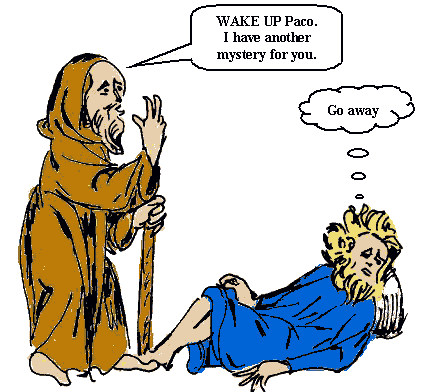
MysteryMy mysterious response Hmmm! I thought about these concepts for years. It made me feel kind of unworthy. That is, until I formulated a
carefully considered response to the issue of mystery. Well actually, it came to me in a dream on the lips of
an angel. The wisdom that was revealed to me can be better understood if we take an example of how mystery
applies in flamenco folklore. (Now it's my turn to be mysterious.) The dance form Garrotín, for example, has
somewhat mysterious origins. Nobody really knows for sure where it came from. I personally don't think the
issue is that important, but some researchers do think it's important, and like to argue about it. In my humble
opinion, whether this dance originated in Galicia, Asturias or Lerida will always remain a matter for the
die-hard intellectuals and is not worth fussing over. To make matters more interesting, my research also
reveals that it has Celtic roots. Again, this is a matter for debate amongst those who find such things
important.
"Who cares"
It's wonderfully refreshing to end a hard day of study in this way. A bit of intellectual anarchy never hurt anybody.

It's not going to make you sing, dance or play better flamenco to know all the answers. A reasonable theory
will keep my curiosity satisfied. I feel no great desire to know it all. Nor do I have any reason to doctor the
facts in order to maintain some imagined air of mystery which does not exist outside the minds of poets and
historians with nothing better to think about. I'm about as basic as they come.
My attitude is: GET REAL My point is this. Mystery is not real. Learning flamenco, like many other things in life, depends mainly on interactions between people. Race or cultural inheritance has nothing to do with it. Mystery is a fabrication of the personalities that believe in it. It equates very simply to an inability to consolidate the variety of opinions inherent in the art form. I know that it's very easy to get confused when confronted with the many inconsistencies in flamenco. But I feel happy because at least I've made an attempt to consolidate it in my own mind. The proccess of researching the subject has been a therapeutic process. It has enabled me to lay the pieces of the jigsaw puzzle on the table and examine them. Most of the pieces fit together, but some don't. I'm not going to try to make them fit. I prefer to say, "Look at that! They don't fit. Isn't that interesting? Now let's get on with life".
Flamenco belongs to everyone
| ||
last update on:

